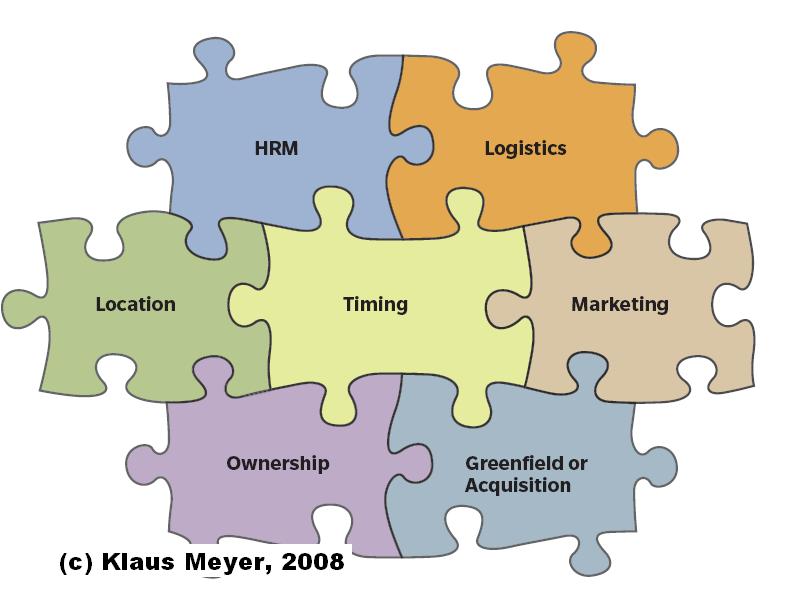|
|
Emerging economies such as Eastern Europe and East
Asia pose special challenges for managers aiming to enter attractive new
markets, or to exploit new opportunities of world-wide division of labour.
My research has over the years analysed various aspects of the challenges,
and I published papers aimed for different audiences. On this page I
provide a brief summary of papers that may be of direct interest to managers
involved in setting up businesses in emerging economies. Click on the button
below the abstract to download the paper.
Management Challenges of Chinese Multinationals
I have been blogging extensively on Forbes and EIU on
the strategies and managerial challenges of Chinese multinationals.
Following this link, you find a compilation of
my
blogs in 2015-2016.
Globalization Challenges: Is National Sovereignty
under Threat?
Multilateral Agreements between nation states are committing
countries to free trade - and many other things. Some of these
commitments have become the focus of anti-globalization campaigners.
While agreements such as TPP and TIPP have the potential to accelerate
economic growth, they trouble is in the detail, in particular in the
investment protection clauses aimed to protect foreign investors, but
creating constraints on national politics. To bring the debate over such
agreement into classrooms around teh world, we have edited in
2016 a special issue of AIB Insights, a newsletter of the
Academy of International Business.
Entry Strategies for Emerging Economies
These two short papers outline an integrative approach to designing
foreign entry strategies. Entry strategies have many aspects that are
interdependent, including location, timing, mode and ownership,
marketing, human resources and logistics. By recognizing these
interdependencies, rather than taken decisions sequentially, investors
can design their entry strategies such as to get the new subsidiary
of to a good starting, thus laying the foundations of successful market penetration and profitable growth.
The item for the Bath Alumni newsletter provides a synopsis of the
challenges faced by companies contemplating foreign entry; the article in
the Princeton Encyclopedia provides a more scholarly overview.
| Meyer, Klaus E. (2008): Strategies for Emerging Economy
Markets, Bath Perspectives, March, in press. |
 |
| Meyer, Klaus E. (2008): Foreign Entry Strategies,
Princeton Encyclopedia of the World Economy, in press. |
 |
 Market Penetration and
Acquisition Strategies for Emerging Economies Market Penetration and
Acquisition Strategies for Emerging Economies
Multinational enterprises (MNEs) are expanding their
global reach, carrying their products and brands to new and diverse markets
in emerging economies. As they tailor their strategies to the local context,
they have to create product and brand portfolios that match their
competences with local needs. Moreover, they
have to develop operational capabilities for the specific context, which
requires complementary resources that are typically controlled by local
firms. We outline strategies for penetrating local markets through
multi-tier branding and the acquisition of local firms. We discuss when to
target mass markets, premium markets, or both, and we offer new
typologies that differentiate acquisition entries by the aggressiveness: staged acquisitions, multiple acquisitions, indirect
acquisitions, and brownfield
acquisitions. We illustrate them by analysing the entry and growth of
Carlsberg Breweries in four very different emerging economies: Poland,
Lithuania, Vietnam and China.
| Meyer, Klaus E. & Tran, Yen Thi
Thu (2006), published in:
Long Range Planning, 39,
no. 2, p. 177-197. |
 |
Doing Business in Vietnam
Over the last thirty years, Vietnam evolved from “war
after war” to an emerging economy with an attractive foreign investment
policy and commitment to a liberalized economy. Although the GDP per
capita is still considerably lower than in the Asian Tiger economies,
and the institutional framework still reflects inheritances from the
central plan system, Vietnam today has a vibrant economy with small
businesses springing up at every street corner. Foreign investors have
been flogging to Vietnam since the early 1990s, with a new peak of FDI
inflow in 2004. This paper reviews the Vietnamese economy, society,
culture, and policies towards foreign investment to inform those
considering to invest in Vietnam, and to provide some practical advice.
Foreign Direct Investment in Emerging Economies
This paper summarizes the literature on the role of FDI
in emerging economies. It focuses on the impact of FDI on host economies,
and on policy and managerial implications arising from this (potential)
impact. It addresses four questions:
- Why do multinational firms invest in emerging
economies?
- How does FDI affect host economies?
- What can governments do (better)?
- What can MNEs do (better)?
| Meyer, Klaus E. (2005), policy discussion paper in preparation for Emerging Markets Forum,
Templeton College, Oxford, December 2005 |
 |
|
Managing partnerships with state-owned joint venture companies: Experiences from
Vietnam
Vietnam is gearing up to join the Asian Tigers. Business
opportunities beckon yet foreign investors often still need to
co-operate with local state-owned enterprises to gain access to
crucial local resources. This creates unusual management challenges.
We outline some of the key challenges arising in such relationships and offer
insight in how to manage them. |
| Nguyen, Ha Thanh & Meyer, Klaus E. (2004),
published in:
Business
Strategy Review 15 (2004), no.1, p. 39-50 |
 |
Corporate Governance in
Transition Economies
|
| Meyer, Klaus E. (2003), published in: The Capco Institute
Journal of Financial Transformation, no. 9 (Nov), p.30-38 |
 |
Management
Challenges in Privatization Acquisitions in Transition Economies
Large-scale
privatization was at the core of economic reform in most transition
economies, except China, in the 1990’s. Privatization creates
special challenges for multinational investors acquiring firms in
the process. Such acquisitions differ from conventional acquisitions
due to the constraints imposed on strategic action by the
privatization context, the depth of subsequent restructuring, and
the necessary sensitivity to the local context and the societal
changes associated with systemic transition. This paper reviews
privatization experiences in Central and Eastern Europe and the
former Soviet Union with the aim of identifying key issues for
managers operating in transition economies. |
| Meyer, Klaus E. (2002), published in:
Journal of World Business 37, no. 4, p. 266-276 |
 |
|

